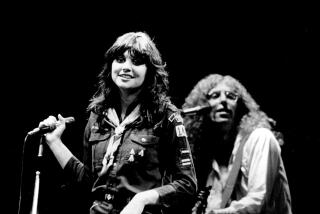JAZZ REVIEWS : ‘Renegade Gentleman’ Lives Up to His Moniker
- Share via
SAN JUAN CAPISTRANO — There’s a new, tougher Larry Carlton on thescene these days. But that doesn’t mean the old Carlton--the one heard on Steely Dan’s “Kid Charlemagne,” the one who has kept the contemporary jazz charts decorated with cleanly picked, happy-sounding music for the past 15 years--has disappeared entirely.
Both Carltons were on hand at the Coach House during the first of two shows the guitarist played Friday: the hard-edged, blues-minded electrician heard on his latest recording, “Renegade Gentleman,” and the sweet-toned melodic master whose career was summed up in the 1990 anthology “Collection.”
Of the two, the outlaw Carlton is by far the more attractive.
*
Even Carlton’s appearance was tough as he took the stage. Gone are the smooth, long-haired good looks of the ‘80s. Instead, this Carlton has short-cropped, thinning hair and a tight, little mustache.
Wearing a dark sleeveless vest that exposed formidable biceps, and occasionally clutching a smoldering cigarette while he played (though no one else in the house was allowed to smoke), he looked more like one of Brando’s hoodlum buddies in “The Wild One” than the family man and session giant that his fans have come to love.
The “Renegade Gentleman” title neatly sums up this dichotomy. And though it seemed a bit strange to hear the roguish-looking guitarist picking out the sweet harmonies of his standby “Smiles and Smiles To Go,” there was enough of the new, more serious Carlton to keep those who have soured on the old, tired Carlton happy.
The best of those moments came in the middle of the show as he delved into “R.C.M.,” a Ray Charles-inspired number from the new album.
Carlton filled the county-flavored exercise with fuzz-tone and twang that carried the uneasy air of some of guitarist Bill Frisell’s out-West offerings. Technical mastery took a back seat to mood setting, as Carlton rifled through an improvisational stretch that was blunt, edgy and nasty from note to note.
From there it was on to an untitled blues that featured some clipped B.B. King-styled lines before modulating with rough-hewn tones and a big, in-your-face climax heightened by the organ play of keyboardist Greg Mathieson. Surprisingly, the audience, which seemed most pleased with the older numbers until this point, gave the guitarist his biggest ovation.
*
The raunchy blues mood continued even when Carlton dragged his 11-year-old son Travis on stage to show off his chops. The kid struck up a John Lee Hooker riff, then soloed in an I’m-still-learning way that gave the number a decided garage-band flavor. This too, was greeted with wild acclaim.
Carlton even gave his feel-good piece “Rio Samba” a dissonant edge in places. “Strikes Twice,” issued in 1988, found the guitarist applying his new, tough-guy image to the tune’s keyboard wash and insistent, driving rhythm. As a measure of flexibility, he moved his three-piece backing band into “Tequila” when someone in the crowd called out for the old Carlton standby.
By contrast, the better-known Carlton pieces pulled from the past seemed like mere exercises. “Minute By Minute” was done by the book, with the guitarist having little to say during the easy-beat melody. A ballad dedicated to his wife had some pleasant passages but, as a whole, was largely unsatisfying.
In either mode, Carlton got good support from Mathieson, bassist Dave Carpenter and longtime drummer John Ferraro, who opened “Rio Samba” with a strong Latin feel.
But the country touches of “Renegade Gentleman,” part of which was recorded in Nashville, were largely missing from this performance. Next time, along with the tough-guy posing, maybe Carlton could put in some of the drawl that has made “Renegade Gentleman” his best effort of the past several years.
Opening act Coco Montoya went a long way toward setting the evening’s blues mood with his Albert Collins-inspired guitar licks and no-nonsense musical presentation. The veteran John Mayall sideman has a strong way with a guitar solo, with thick, meaty notes chopped from strong riffs supplied by his three-piece backing combo.
Montoya’s voice may lack in character, but he works hard to bring it some interest with occasional gruffness and an overall sense of sincerity. But his guitar playing is the real thing. Some record company should pick up his European release and bring his recorded work to blues fans in this country.
More to Read
The biggest entertainment stories
Get our big stories about Hollywood, film, television, music, arts, culture and more right in your inbox as soon as they publish.
You may occasionally receive promotional content from the Los Angeles Times.










